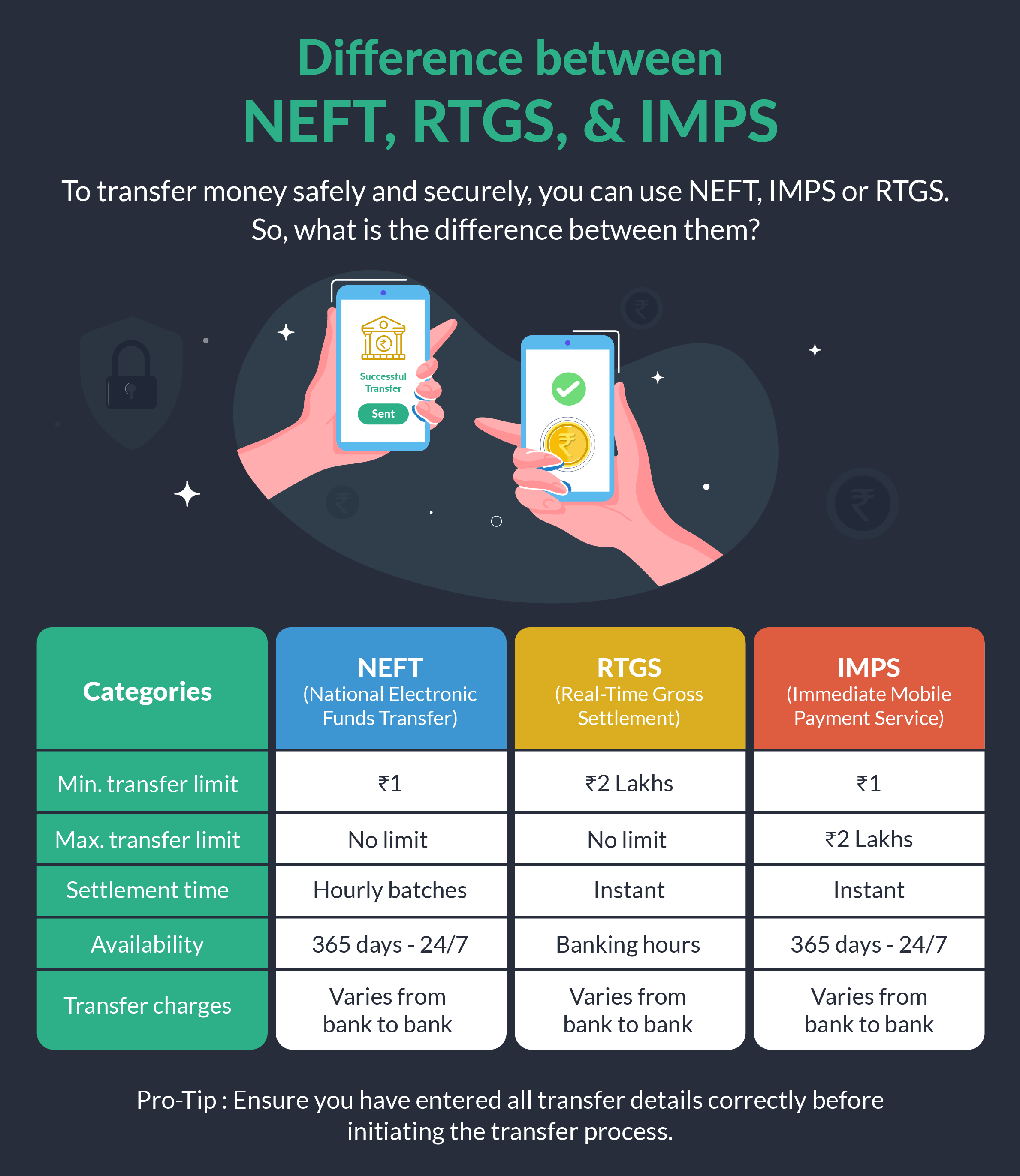Electronic funds transfer methods like NEFT, IMPS, and RTGS can be beneficial if you frequently transfer money from one bank account to another. These digital payment systems provide a simple and quick solution to make transactions.
Be it transfer limits, operating hours, or transfer speeds, these systems vary but serve a similar purpose. Hence, to choose between these three electronic fund transfer methods, you must know the difference between NEFT vs IMPS and RTGS.
Currently, IMPS, NEFT, and RTGS are the three kinds of electronic bank transfer systems operational in India. Before you understand the difference between IMPS and NEFT along with RTGS in detail, you must know about these fund transfer methods and how they work.
IMPS
Immediate Payment Service, also known as IMPS, is an interbank payment system established by the National Payments Corporation of India (NPCI). The service is available 24/7 and transfers the funds to the beneficiary’s account instantly.
To process such transactions, banks generally levy a nominal fee known as the IMPS transaction fee, which is inclusive of GST. The amount of fees may vary from one bank to another.
NEFT
National Electronic Fund Transfer (NEFT) is an interbank payment system facilitated by the Reserve Bank of India (RBI). Like IMPS, NEFT is also available 24x7. However, it may take anywhere from 30 minutes to up to 2 hours for the beneficiary to receive the funds in their account.
This delay in transferring funds is primarily because the payment system processes the transaction requests in batches.
RTGS
Real-Time Gross Settlement, or RTGS, is another interbank payment system operated by the Reserve Bank of India (RBI). These only facilitate high-value transactions of ₹2 Lakhs and above. Similar to IMPS, RTGS fund transfers are available 24X7 and get completed instantly.
When choosing between IMPS, NEFT or RTGS, consider the aspects of each of these payment systems to determine the one that aligns with your needs.
Here is how these payment methods differ from each other:
NEFT vs IMPS vs RTGS |
|||
Particulars |
NEFT |
RTGS |
IMPS |
Availability |
Offline and online |
Offline and online |
Only online |
Settlement |
Every half-an-hour |
Real-time |
Real-time |
Fund Transfer Duration |
30 minutes to 72 hours |
Up to 30 minutes |
Instantly |
Minimum Transfer Limit |
₹1 |
₹2 Lakhs |
₹1 |
Maximum Transfer Limit |
No maximum limit (Exception – ₹50,000 for cash remittance within India and Nepal) |
No maximum limit |
₹5 Lakhs |
Transaction Charges |
Depends on the bank |
For transactions ranging between ₹2 Lakhs and ₹5 Lakhs - up to ₹25 plus GST For transactions above ₹5 Lakhs - ₹50 plus GST |
Depends on the bank |
Now that you know the difference between NEFT and IMPS or RTGS, you can decide which one to use as per your payment requirements.
Here are some of the factors you need to consider:
1. Transaction Fees
Depending upon the amount, RTGS transfers usually attract a fee ranging from ₹25 to ₹50 per transaction.
2. GST
You are also liable to pay an 18% Goods and Services Tax (GST) on the specific transaction fees.
3. Network
Both the transferor bank and the transferee bank must be on the same payment network to use that particular system to transfer funds.
As digital payment methods continue to become more popular in India, understanding the key terms related to NEFT, RTGS, and IMPS is crucial.
Here are some of the most important terms that you need to know:
- IFSC Code: This is an 11-digit alphanumeric code that uniquely identifies every bank branch in India participating in electronic fund transfers. You need to provide the recipient's bank's IFSC code to initiate an NEFT or RTGS transaction.
- Beneficiary: The recipient of the funds is called the beneficiary. You need to provide their bank account number and IFSC code to transfer funds.
- Remitter: The person who initiates the transaction is called the remitter. The remitter needs to have the beneficiary's bank account number and IFSC code to transfer funds.
- Settlement Time: NEFT transactions are settled in hourly batches, while RTGS and IMPS transactions are settled in real-time.
- Transaction Reference Number: A unique reference number is generated for every transaction, which can be used to track the transaction's status.
It is important to take certain precautions to ensure the safety of your money and personal information.
Here are some precautions you should take when using these transfer systems:
Verify the Recipient's Details
Before initiating a transfer, make sure you have the correct bank account number, IFSC code, and other necessary details of the recipient.
Use a Secure Network
When initiating a transfer, make sure you are connected to a secure network, such as a password-protected Wi-Fi network or a secure mobile data connection. Avoid using public Wi-Fi or unsecured networks, as they may expose your personal and financial information to potential hackers.
Use Two-factor Authentication
Make sure you follow the bank's guidelines for two-factor authentication to ensure the security of your transaction.
Keep Your Device Updated
Make sure your mobile device or computer is updated with the latest security patches and antivirus software to avoid any potential security breaches.
Keep Transaction Records
After completing a transfer, make sure you keep a record of the transaction details, including the date, time, and amount transferred to track the transaction and resolve any issues if there are any discrepancies.
Be Aware of Phishing Scams
Be cautious of emails, text messages, or phone calls asking for your personal or financial information. These may be phishing scams designed to steal your information and compromise your bank account.
By following these precautions, you can use IMPS, NEFT, and RTGS transfer systems securely and confidently and avoid any potential risks associated with online financial transactions.
More About Payments & Other Credit Cards |
||||
|
||||
About Credit Cards Partners and Services
- RBL Credit Card
- SBI Credit Card
- ICICI Credit Card
- Axis Credit Card
- Bajaj Finserv DBS Bank Credit Card
- Apply for Credit Card
- Credit Card Balance Transfer
- Best Fuel Credit Card
- Business Credit Card
- Corporate Credit Card
- Credit Card against Fixed Deposit
- Credit Card Settlement
- Credit Card Documents
- Credit Card Eligibility Criteria
- Credit Card EMI
- Features & Benefits of Credit Card
- Interest Rate on Credit Card
- International Credit Card
- Credit Card Limit
- Loan on Credit Card
- Credit Card Lounge Access
- Credit Card Netbanking
- Credit Card Bill
- Credit Card Pin Generation
- Credit Card Reward
- Shopping Credit Card
- Check Credit Card Statement
- Types of Credit Card
- Credit Card Billing Cycle
- Credit Card Meaning
- Best Credit Card In India
- Indusind Credit Card
- Rupicard
Non Partner Credit Cards
Quick Links 1
- Student Credit Card
- Apply for Bihar Student Credit Card
- MNSSBY
- West Bengal Student Credit Card
- Kisan Credit Card- (KCC)
- Apply for Kisan Credit Card
- Kisan Credit Card Helpline Number
- Kisan Credit Card Eligibility
- Limit on Kisan Credit Card
- Interest Rate on Kisan Credit Card
- OTP
- Pay Slips
- Pay Slip Download
- Pay Slip Format
- KYC
- KYC Status
- Documents for KYC
- eKYC
- Types of KYC
- KYC Update
- ACH mandate Cancellation
- ACH Charges
- ACH Form
- ACH Mandate
- ACH Mandate Registration
- Mobile Banking
Quick Links 3
- Download Form 16
- How to fill Form 16
- Form 16 Types
- How to generate ATM Pin
- How to use ATM Card
- Withdraw money from ATM
- ATM Card
- Check status for Pan Card
- Pan Card Apply online
- Download ePan Card
- Pan Card
- What is Pan Card
- Pan Card Documents
- Duplicate Pan Card
- Link Aadhar Card to Pan Card
- Pan Card Lost
- Pan Card Uses
- Pan Card Correction Form
- Pan Card Verification
- Customer Care number of Pan Card
- Pan Card for Minors
- Pan Card form 49a
- NSDL Pan Card
- Instant Pan Card
- AO code for Pan Card
- Utiitsl Pan Card
- How to Download Form 16
Petrol Prices
- Petrol Price In Bangalore
- Petrol Price In Mumbai
- Petrol Price In India
- Petrol Price In Kolkata
- Petrol Price In Hyderabad
- Petrol Price In Goa
- Petrol Price In Punjab
- Petrol Price In Haryana
- Petrol Price In Noida
- Petrol Price In Rajasthan
- Petrol Price In Bihar
- Petrol Price In Gujarat
- Petrol Price In Maharashtra
- Petrol Price In Ghaziabad
- Petrol Price In Tamilnadu
- Petrol Price In Jharkhand
- Petrol Price In Faridabad
- Petrol Price West Bengal
- Petrol Price In Andhra Pradesh
- Petrol Price In Telangana
- Petrol Price In Odisha
- Petrol Price In Uttar Pradesh
- Petrol Price In Chhattisgarh
- Petrol Price In Madhya Pradesh
- Petrol Price In Mizoram
Which is better: NEFT or RTGS or IMPS?
Each of these payment types has its advantages. When comparing IMPS vs RTGS, the parameter that tends to differ is the minimum amount. While RTGS requires you to transfer a minimum amount of ₹2 Lakhs, the IMPS transfer facility does not have a minimum limit.
There is a difference between NEFT and RTGS as well. Unlike RTGS, banks do not clear NEFT payments immediately but in batches. Also, like IMPS, NEFT does not have a minimum transfer amount and is available round-the-clock.
What is the difference between NEFT and RTGS?
When comparing RTGS vs NEFT, the difference is primarily in the process of clearing the payments and the minimum amount. The RTGS payment system clears funds separately and instantly.
However, banks clear NEFT transfer payments in batches. Also, while you can transfer any amount via NEFT, RTGS requires you to transfer a minimum of ₹2 Lakhs per transaction.
What is the difference between IMPS and NEFT?
While both NEFT and IMPS services are available round-the-clock, IMPS allows clearing of funds instantly and individually. This is different in the case of NEFT, where banks process the transfer requests in batches. Also, IMPS services are only available online, whereas NEFT is available online and offline.
Is NEFT faster than IMPS?
When comparing IMPS vs NEFT, you must note that the latter takes longer time to complete.
Is NEFT cheaper than IMPS?
Banks decide the charges on NEFT and IMPS services. Depending on the bank and the transaction, NEFT charges range from ₹2.50 to ₹25, and IMPS charges range from ₹5 to ₹15 per transaction.
What is the maximum limit for NEFT?
There is no set limit for NEFT transactions. However, you can transfer only a certain amount daily, depending on the bank and the transaction.
What is the IMPS limit per day?
Once you have added a beneficiary, you can do an IMPS transfer up to an amount of ₹25,000 in the first 24 hours. Note that the IMPS limit depends on the respective bank's policy and can range anywhere between ₹10,000 and ₹5 Lakhs.
Can I do NEFT 24/7?
Yes, NEFT operates round the clock. This means you can initiate a transfer using NEFT at any time of the day or night, even on weekends and holidays.
What are the NEFT timings?
NEFT works 24 hours on all days, including holidays and weekends. However, the actual time taken may vary depending on the time of initiation of the transfer and the recipient bank's clearance process.
Is the RTGS mode of payment safe?
Yes, RTGS is a safe and secure mode of payment. Banks process RTGS transfers in real time and settle them individually. The transfer of funds from one bank account to another without any intermediary involvement enhances safety.




